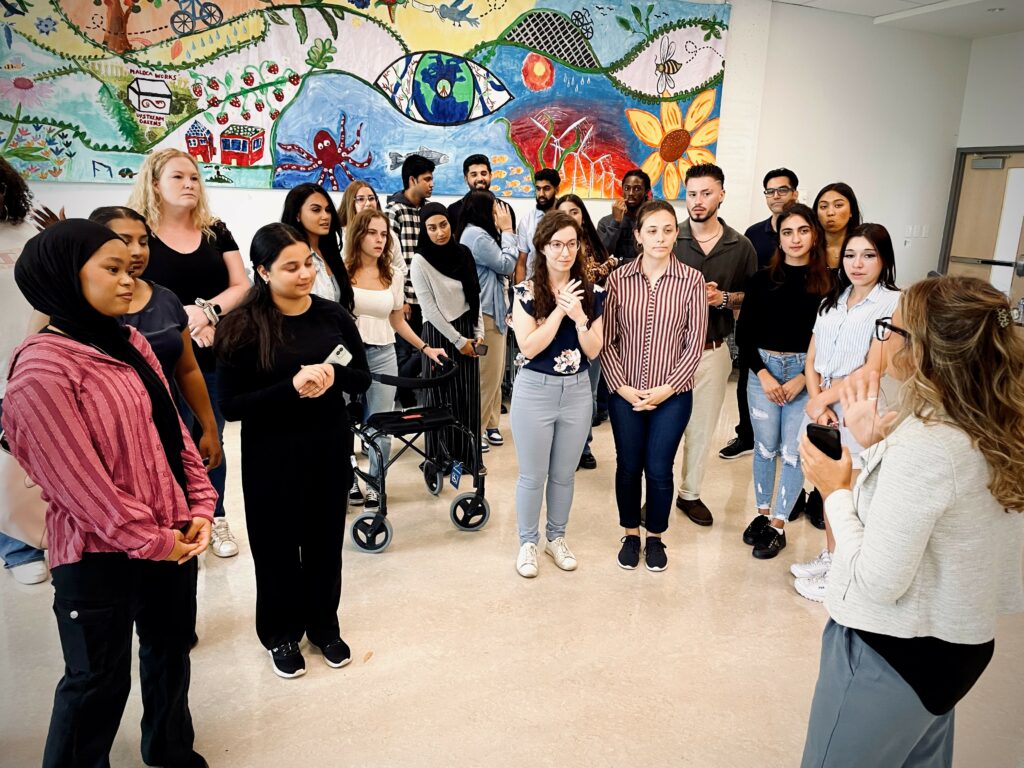
Two groups of York University students travelled to Cuba this spring as part of a new Faculty of Health course exploring human rights, Cuban culture and the country’s health-care system. The course – Experience Cuba: Enacting the human right to health and health equity, taught by Jessica Vorstermans, an associate professor in the School of Health Policy & Management – marked the first simultaneous collaboration between York U, the University of Holguin and the Medical University of Holguin. It is an offering the Faculty of Health hopes to strengthen and continue.
The 34 students in the Experience Cuba course were part of a cohort of more than 300 York University students participating in faculty-led study abroad programs this spring and summer. They received funding support through York International’s Sustainable Development Goals (SDGs) in Action Program, which is funded by the Government of Canada’s Global Skills Opportunity.
The course provided a look at how the Cuban health-care system flourishes amidst a landscape of economic crisis. The country has been under a United States trade embargo since 1962, resulting in a scarcity of many goods – including medicines and modern medical equipment. Nonetheless, many Cuban indicators of health are comparable to those in Canada, said Vorstermans.
“Cuba is an example of everything we want an equitable and universal system to look like, but in an environment of great scarcity,” Vorstermans said. “It’s a system that prioritizes preventive and primary care.”
Developed by Vorstermans and supported by Julie Hard, director of global and community partnerships in the Faculty of Health, the new course attracted so much interest that the Faculty chose to run two sessions back to back to accommodate more students.
While in Cuba, the students attended lectures about the health-care system at the partner universities and visited the neighbourhood network of clinics – the first stop for patients. They toured the medical school and learned about the curriculum, which also includes dentistry and traditional medicine.

It was an eye-opening experience for the students, who were housed with Cuban families in a Holguin neighbourhood, took the university bus to campus, and visited many cultural sites during their visit.
“It was a two-week snapshot of Cuban life,” Hard said. “Most Canadians think of Cuban resorts and beaches, but living in a home in a country coping with scarcity was very different. It was an immersive cultural experience that went way beyond textbooks and the travel brochures.”
They learned about navigating fuel shortages and gained an appreciation for how hard people work to put food on the table. “The state makes sure there is enough,” said Hard, “but there isn’t the same selection to which we’re accustomed.”
The students were amazed by the efficiency of the Cuban health-care system, and couldn’t help but draw comparisons to Canada’s.
“The health care in Cuba is inclusive; it accommodates all types of people,” said El Salvador-born Alexa Rios, a first-year health studies student. “Everything is egalitarian, and everyone gets the same care…. If people with so few resources can create a welcoming system, why can’t we – with all of our opportunities – do the same?”
Sophia Desiri, another first-year health studies student, was very impressed by the strong emphasis on preventive care and the use of local clinics as the first line of defence against illness, rather than emergency rooms.
“This course opened my eyes to what health care really means, which is community,” she said. “The Cuban system looks at patients as people, with feelings and needs.”
Gurher Sidhu, a fourth-year global health student, noted the emphasis the Cuban system places on primary care, with integrated health-care teams that serve the local community at polyclinics.
“The system was designed logically, with common sense,” she said. “The family physicians, for example, live in their communities – so their patients are also their neighbours. If someone doesn’t show up for an appointment, they worry. I wonder how we could foster that commitment to care here.”
Sidhu hopes to take more time to reflect on what she experienced and to consider how lessons learned could be applied within the Canadian context. Looking back at her journal – which she was required to write in while abroad – might offer some insights. At a Knowledge Mobilization Fair held last month at York U, the students shared their takeaways with their families and other invited guests.
“We were very glad to partner with and support the Faculty of Health with the launch of the Experience Cuba summer abroad course this year,” said Helen Balderama, director of global engagement and partnerships at York International. “The insights and observations that were shared by the health students precisely demonstrate the whole point of global learning (and study abroad) programs: to be exposed to new ideas and experiences, reflect on them, and be moved to action or further reflection.”
As for Vorstermans and Hard, they plan to run the course again in 2025 and deepen their partnership with the two Cuban institutions.
“This was a transformative learning experience that was amazing to witness,” Vorstermans says. “We view these connections as the beginning of a long-term partnership that we co-create so it is reciprocal.”
